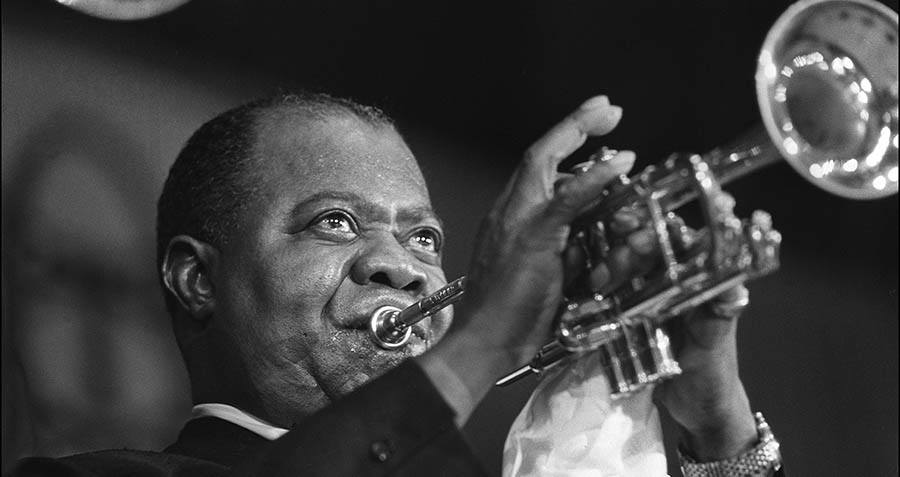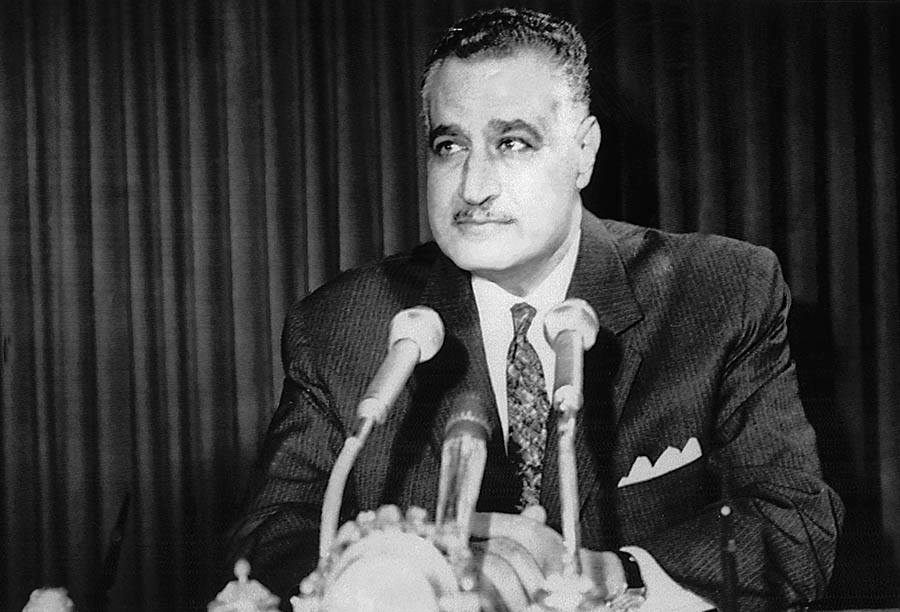The photo of Louis Armstrong playing his trumpet before the Giza pyramids is iconic — the story behind it, however, is chaotic.

AFP/Getty ImagesLouis Armstrong
The U.S. government has done much over the years to warrant the suspicion and paranoia of international political leaders, but in the late ’50s and early ’60s, Egyptian President Gamal Abdel Nasser took that paranoia to celestial heights when he accused renowned trumpeter Louis Armstrong of being a spy — and using his “scat” singing to pass secret messages to other spies in the Middle East.
While not necessarily based in rational thought, Nasser’s claims were at least correct in as much as Armstrong had physically been to the region. Following the legendary jazz musician’s first tour of the Middle East in 1959, Nasser — himself in the throes of his own pan-Arab nationalist movement — looked to Armstrong with a questioning eye.
Could it be that Armstrong did not simply wish to spread his “scat” music, or even a pro-West message, to the region, but instead hoped to deliver confidential government missives to nearby spies?
Nasser believed it to be so, and Egyptian newspapers at the time likely helped shape that view. Indeed, in 1959, papers in the country alleged that Armstrong led an “Israeli spy network,” with the Al-Arham newspaper reporting that Lebanese authorities had caught “famous American Negro musician Louis Armstrong, who had recently visited Beirut” leading a gang of artist-spy conspirators.

STF/AFP/Getty ImagesEgyptian President Gamal Abdel Nasser
Word of Armstrong’s supposed spy dealings eventually made it to the States. Upon hearing these allegations, this time from Nasser’s mouth, Armstrong mailed the Egyptian president a copy of his scat singing record, writing that “I don’t have to be a spy to earn a living. I have enough money blowing the horn and I have a very happy life doing it. Why don’t you tell these people who are spreading all this stuff to come around. I’ll tell them a few good traveling salesman jokes.”
Still, Nasser’s allegations persisted, and when Armstrong returned to Egypt in 1961, reporters asked the musician if he supported Zionism. As Middle East scholar Amro Ali writes, an incensed Armstrong replied, “What is that, Daddy?”
“You helped the Jews a lot,” the reporters responded.
Armstrong fired back, “Yeah, I help them. I help anybody. I help you…I’m going to tell you this. I got a trumpet, and I got a young wife, and I ain’t got time to fool with none of the stuff you guys talking about.”
Armstrong had no time for the paranoia pushed from any side, Ali points out. When in Beirut, reporters asked Armstrong why he planned to play music in Israel, to which Armstrong responded: “Let me tell you something. When I go down there, the first thing they going to tell me, how come you play for them damn Arabs over there?”
Turns out that Armstrong was right. Upon arriving in Israel, the first question he received centered on why he would perform in Arab countries. An exasperated Armstrong responded, “I told them that you guys were going to say the same damn thing. So ain’t none of you no better than the other side. You’re as bad as they are, man.”
As Ali writes, the traveling musician who never claimed “to know nothin’ about politics” got to the very center of a toxic worldview that would spell trouble for both Israel and Egypt for the foreseeable future.
“The impoverished thinking that unfairly and irresponsibly attacked Armstrong – raised a generation that rules Egypt today, if not the Arab world, and sets the tone for a destructive conspiratorial language that tarnishes, if not sentences, the innocent, disembowels the political public sphere and foments political and social tensions,” Ali wrote.
Likewise, “Armstrong visited an Israel that has since become an increasingly racist, brutal and a militarised state that would make Apartheid South Africa look like a lightweight. Not helped by the same government that sponsored Armstrong’s visit.”
Under this lens, the iconic photo taken of Armstrong playing his trumpet before the pyramids at Giza assumes a deeper meaning. His words on his time in the region — almost poetic in their simplicity — offer a lesson that goes unheeded today, not just in Israel or Egypt but the world.
“Let me tell you something, man,” Armstrong said while in Beirut. “That horn ain’t prejudiced. A note’s a note in any language.”
For more on Egypt past and present, have a look at how surprisingly modern and open the country was in the 1960s. Then, see what it was like the first time archaeologists ever opened King Tut’s tomb.





